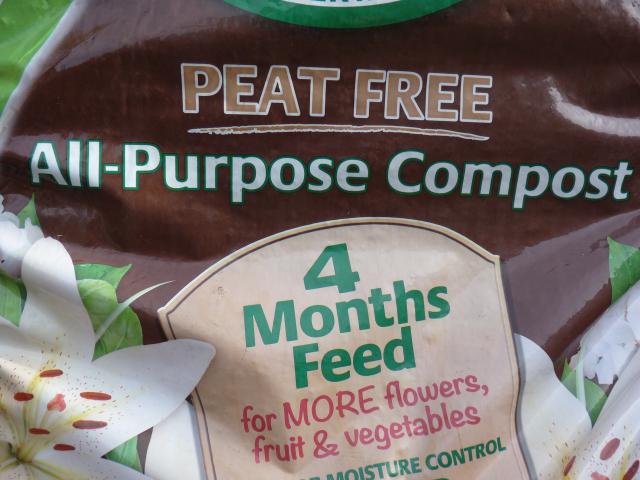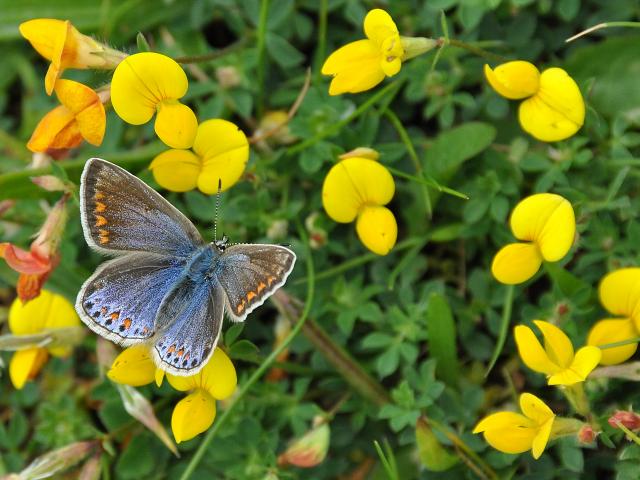Sow seeds but stay peat free
The recent blast of warm weather inspired a post-winter assessment of the garden. The bees were busily buzzing around the Heather and Rosemary and Peacock and Brimstone butterflies paid a flying visit. Apart from the bright yellow of the Daffodils, the most noticeable thing was the large number of young plants that had popped up amongst the gravel and stones: Primrose, Foxglove, White Valerian, Erigeron karvinskianus and Verbena bonariensis
Sometimes nature does a great job of sowing seeds for you, but if you want to take charge then March is a good time to start planning and sowing. You can grow annuals, biennials and perennials from seed that provide butterflies and moths with nectar for the adults and foodplants for their caterpillars.
Some seeds can be sown outside where they are to grow, towards the end of this month or into early April. Others will need to be started indoors in trays before hardening off and planting out when the risk of frosts has passed.
Go peat-free

Seeds need fine, free-draining compost or soil. If you are planning on sowing seeds in trays or containers, then please make sure that you use peat-free compost. Regular or reduced-peat composts usually contain more than 50% peat and sometimes 90%. Peat bogs are important habitats for many species including the Large Heath butterfly and Argent & Sable moth. They accumulate very slowly and have built up over thousands of years. When peat is extracted for commercial purposes this precious environment is lost and large amounts of carbon dioxide are released into the atmosphere. It doesn’t make sense to use compost containing peat to grow plants to help butterflies and moths in your garden when, in the process, habitat elsewhere is being destroyed.
The government introduced a target for peat to be phased out in composts available for home gardeners by 2020 and for commercial growers after 2030, but butterflies and moths need you to make the change right now.
We can’t hide from the fact that peat-free composts often don’t perform as well as those containing peat. However, a recent Which? magazine trial showed that some peat-free versions actually out-performed the peat. Several companies produce peat-free composts including Waitrose, SylvaGrow, Dalefoot and Westland – New Horizon. These brands have different formulas with combinations of wood fibre, composted bark, coir (made from coconut husks) or wool. It is worth trying out a few to see which one best suits your needs. Ericaceous versions, for acid-loving plants, are also available from SylvaGrow and Dalefoot - if not at your local garden centre then online.

You can sow a range of seeds to provide you with a smorgasbord of plants of various heights and flower shapes and colours, to suit different parts of the garden. From the low-growing Common Bird’s-foot-trefoil Lotus corniculatus (foodplant of the Common Blue) to the towering Sunflower Helianthus annuus. From the round flowers of Ox-eye Daisy Leucanthemum vulgare to the flat heads of umbellifers such as Wild Carrot Daucus carota.
When seeds are sown direct, they often look best if grown in drifts, for example wildflowers such as the annual Cornflower Centaurea cyanus biennials Dark Mullein Verbascum nigrum and Foxglove Digitalis purpurea (foodplant of the Foxglove Pug); and perennials Red Campion Silene dioica (foodplant of the Rivulet), Field Scabious Knautia arvensis, Common Knapweed Centaurea nigra and Yarrow Achillea millefolium (foodplant of the Tawny Speckled Pug).
Colourful containers of orange Nasturtium Tropaeolum majus provide an alternative foodplant to your cabbages for the Large and Small White, while Pot Marigold Calendula officinalis provides nectar.
Half-hardy annuals like Cosmos bipinnatus should be sown under cover in March and April and transplanted out after first frosts or sown outside in May.
Enjoy getting stuck into a new year of gardening and feel good about being peat-free from the start.
Happy Gardening!
The Secret Gardener


